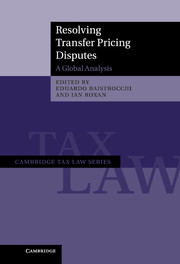Book contents
- Frontmatter
- Contents
- List of figures
- List of tables
- List of contributors
- Acknowledgements
- The Golden Bridge: analytical table of cases by topics in the OECD Guidelines
- Table of Cases
- Abbreviations
- Part I The context of transfer pricing disputes
- Part II North America and Europe
- Part III Asia Pacific
- Part IV BRIC Countries
- Part V South America, Middle East and Africa
- Part VI Conclusion
- 21 Transfer pricing dispute resolution: the global evolutionary path (1799–2011)
- 22 Resolving the resolution of transfer pricing disputes: global trends and divergences
- Index
- References
21 - Transfer pricing dispute resolution: the global evolutionary path (1799–2011)
from Part VI - Conclusion
Published online by Cambridge University Press: 05 November 2014
- Frontmatter
- Contents
- List of figures
- List of tables
- List of contributors
- Acknowledgements
- The Golden Bridge: analytical table of cases by topics in the OECD Guidelines
- Table of Cases
- Abbreviations
- Part I The context of transfer pricing disputes
- Part II North America and Europe
- Part III Asia Pacific
- Part IV BRIC Countries
- Part V South America, Middle East and Africa
- Part VI Conclusion
- 21 Transfer pricing dispute resolution: the global evolutionary path (1799–2011)
- 22 Resolving the resolution of transfer pricing disputes: global trends and divergences
- Index
- References
Summary
Introduction
The international tax regime has found itself in the midst of a creeping transition from rules to standards from the beginning of the twentieth century. The self-enforcing, rule-based arm's length principle, which by the early 1930s had obviated most problems of allocation of the international income tax base, has gradually turned into a procedural, standard-based arm's length principle that has been particularly visible since the world's first bilateral advance pricing agreement (APA) was concluded between Australia and the United States in 1990.
This transition entails important consequences for the structure of transfer pricing dispute resolution at the outset of the twenty-first century. It includes shifting ultimate decision-making down the legal hierarchy (by relying on APAs, tax litigation, and other similar procedures to solve international tax disputes), with the consequent increasing importance of experts and the quality of state intervention to enforce the arm's length principle.
The global evolutionary path of transfer pricing dispute resolution consists of six stages as of the start of income taxation in the United Kingdom in 1799 to finance the war against the French Emperor Napoleon. The arm’s length principle (ALP) has increasingly been, in turn, the central regulatory technology for solving transfer pricing disputes worldwide since its emergence in US domestic law at the beginning of the twentieth century.
- Type
- Chapter
- Information
- Resolving Transfer Pricing DisputesA Global Analysis, pp. 835 - 883Publisher: Cambridge University PressPrint publication year: 2012



